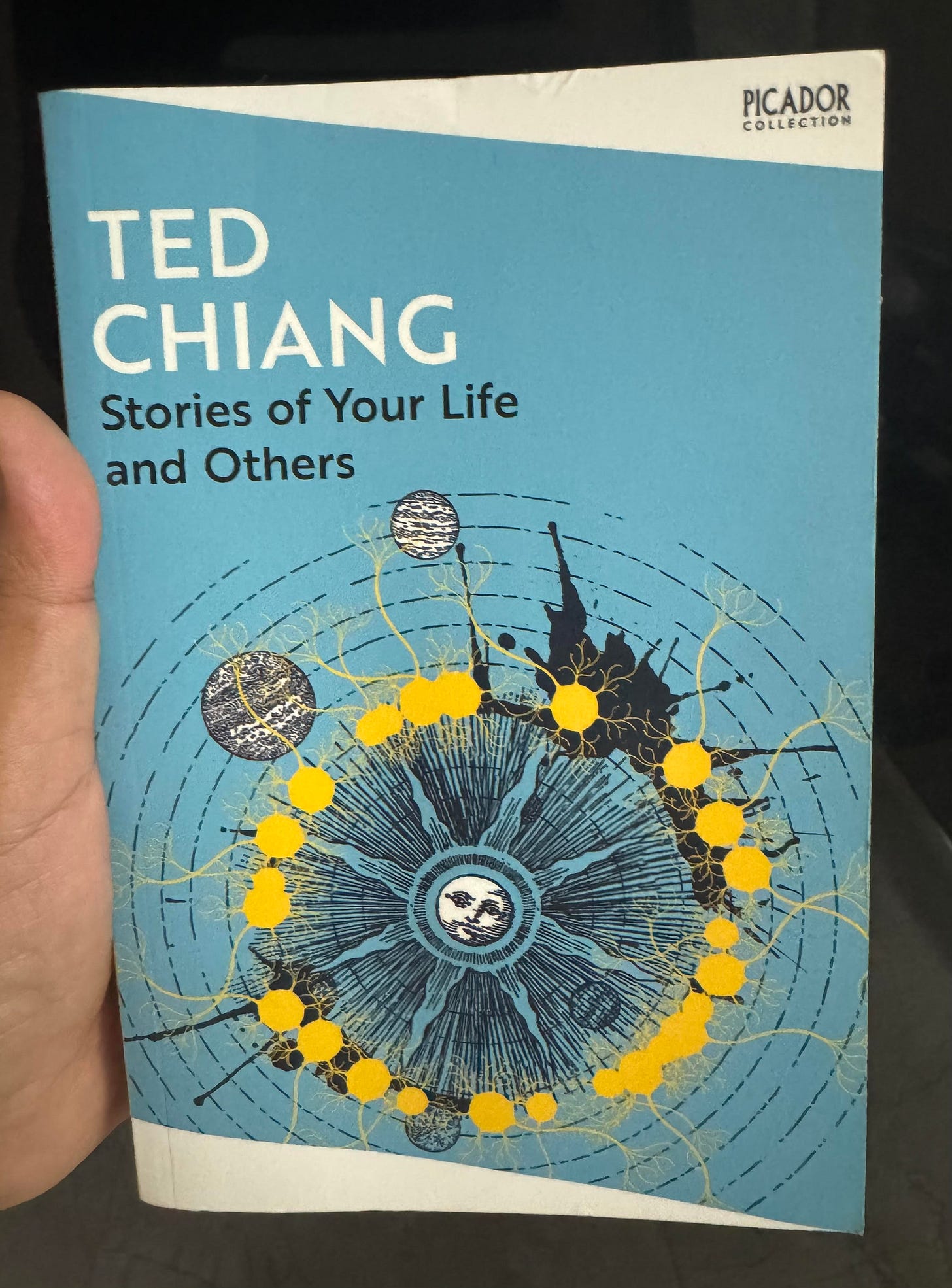I recently started reading Science Fiction after hearing Naval Ravikant podcasts. In one such podcast he emphasized how science fiction helped him understand big ideas. He specifically mentioned the Ted Chiang story Understanding. So I picked up Ted Chiang’s Stories of Your Life and Others . It is an extraordinary collection of eight stories that push the boundaries of science fiction by grounding big, mind-bending concepts in deeply human narratives. This collection showcases Ted Chiang’s rare ability to turn abstract philosophical and scientific concepts into emotionally and elegantly written stories..
The centerpiece, “Story of Your Life,” is perhaps the most well-known, having inspired the acclaimed film Arrival. It explores the nonlinear experience of time through the story of a linguist learning an alien language. Ted uses the premise to delve into memory, free will, and the bittersweet pain of knowing one’s future. It’s quietly devastating, intellectually rich, and an unforgettable meditation on what it means to live with full awareness of loss and love.
However my favorite stories were Understand and Division by Zero.
Story Number 2 : Understand
“Understand” begins with a medical experiment. Leon Greco, a man recovering from brain damage, is given an experimental drug called hormone K that not only repairs his neural tissue but vastly enhances his cognitive functions. What starts as rehabilitation soon transforms into a rapid evolution of intelligence. It discusses following major ideas:
The Nature of Intelligence:
As Leon’s intelligence grows, so does his detachment from normal human experience. He quickly learns languages, deciphers complex texts, and develops his own mental tools—“cognitive structures”—to process reality more efficiently. Chiang is asking: What does intelligence mean when it surpasses the emotional, social, and ethical limits of human experience?
Alienation Through Superiority:
Leon’s growing intelligence creates a chasm between him and the rest of humanity. He no longer sees people as individuals, but as patterns to be decoded. As he becomes more god-like in his thinking, empathy fades. Chiang explores a frightening possibility: that hyper-intelligence may lead to dehumanization rather than transcendence.Conflict of Equals:
The story takes a turn when Leon encounters another subject, Reynolds, who has also undergone enhancement. This introduces a philosophical and literal duel—one based not on brute strength but on mental agility. Their confrontation is not just about survival, but about whose mental model of the universe will dominate.Control vs. Understanding:
The title has a double meaning. “Understand” refers both to Leon’s quest for intellectual mastery and the tragic irony that understanding, taken to its extreme, can mean losing touch with love, meaning, and humility.The story in short is a modern retelling of the Frankenstein myth, but instead of a monster, it’s a mind. Chiang warns that intelligence unmoored from ethics or emotion is a dangerous path. The real tension is not between smart and stupid, but between knowing and feeling. As Leon reaches the pinnacle of understanding, he drifts into moral emptiness.
Story Number 3: Division by Zero
This is a much quieter, more internal story. It mixes two narratives: one of Renee, a brilliant mathematician who discovers a theorem that undermines the consistency of mathematics, and her husband Carl, who watches her unravel this theory emotionally and intellectually. This story discusses following ideas:
Mathematical Crisis as Existential Crisis:
Renee proves that arithmetic is inconsistent—meaning the foundations of mathematics are flawed. For her, this is a shattering revelation. Math was her source of order, truth, and meaning. To discover that it’s not perfect is, for her, equivalent to discovering that God doesn’t exist.The Fragility of Belief:
Renee’s emotional breakdown is deeply tied to her intellectual identity. She loses her sense of self and purpose. Carl, who tries to comfort her, represents the layperson—someone who cannot grasp the magnitude of her discovery, and thus cannot truly understand her despair.Communication Breakdown:
The story is as much about the failure of a relationship as it is about math. Carl wants to love and support Renee, but he doesn’t understand what she’s going through. In one of the most heart-wrenching moments, he considers leaving her for her own good—not because he doesn’t love her, but because his love feels useless to her.
In short Ted Chiang uses the metaphor of mathematical collapse to explore emotional breakdown and relational disintegration. The core message is that belief whether in a system, a person, or a worldview is foundational to our well-being. When that belief is undermined, the consequences are not just intellectual but deeply personal.
Apart from the above stories Story Number 1 “Tower of Babylon” which shows the construction of a literal tower to reach the vault of heaven, and Story Number 8 “Liking What You See: A Documentary” which is a fictional oral history about a technology that eliminates people’s ability to perceive physical beauty is an interesting read.
Ted Chiang’s style is simple, clear, and precise—never showy, always intentional.
Happy Reading !




